What Can I Do If My Child’s Other Parent Will Not Allow Me to See My Child?
FAQ: I live in Orange County CA; the other parent is not allowing me to see my children, what can I do to see them? In California, it is usually in a child’s best interests to spend time with, and build a relationship with both parents. If your child’s other parent will not allow you to spend time with your children in California, you have the right to take legal action to spend time with your children.
First, ask yourself a few questions.
- Are you a legal parent or guardian of your child?
- Do you and your child’s other parent have a valid and legal custody and visitation agreement?
These questions are important to understand, because your next step depends on where you currently stand. Once you have established who a child’s parents are, the parents have both the legal right to spend time with the child, as well as the legal obligation to financially support the child.
Establishing Parentage in OC California
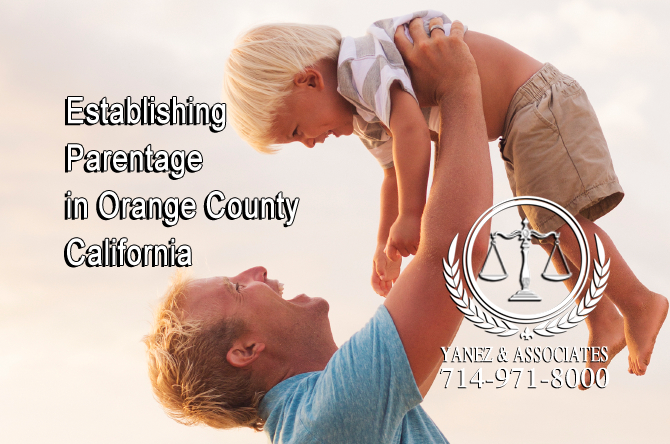
It is necessary to establish parentage prior to creating or enforcing any child custody or visitation agreements in California, so if you have not already established parentage, this will be your first step.
Parentage, also called paternity, is a way of legally establishing a child’s parents. Usually, when a child is born, if the parents are married, the father is assumed to be the husband of the mother. However, if the parents are unmarried, parentage will need to be legally established even if the father can prove that he is the biological father of the child.
In California, this simply means that the parents need to obtain a legal court order that states who a child’s parents are. A child does not have a legal father until paternity has been established, and a parent has no legal rights or obligations regarding the child until paternity has been established.
Parentage can be established several ways: parents can sign a Voluntary Declaration of Paternity, or they can obtain a court order that names the parents.
Signing a Voluntary Declaration of Paternity
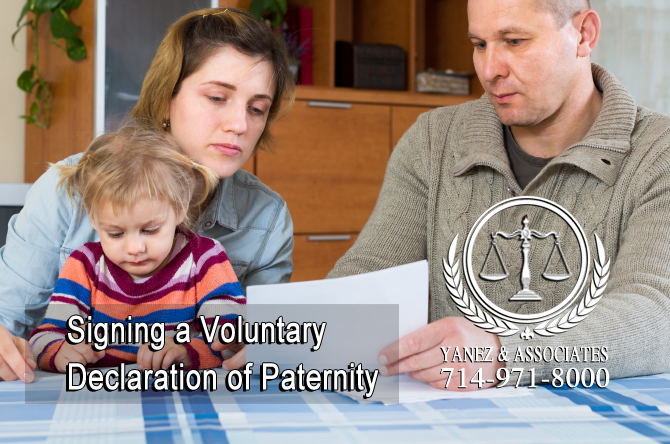
Either at the hospital when the child is born, or at a later date, both parents may sign a Voluntary Declaration of Paternity
This document simply says that the two people signing it are the legal parents of the child, and they have both legal rights and obligations regarding that child.
Once a Voluntary Declaration of Paternity has been signed, both parents’ names can be put on a child’s birth certificate. If the father does not sign at the hospital where the child is born, his name can be added to the child’s birth certificate at a later date.
If the Voluntary Declaration of Paternity is not signed at the hospital, it must be signed at one of the following locations, and also signed by a notary.
• Your local child support agency
• The registrar of births
• A welfare office
• Your local superior court
Once signed, it must be filed with the California Department of Child Services in the Paternity Opportunity Program office.
A Court Order that Establishes Parentage
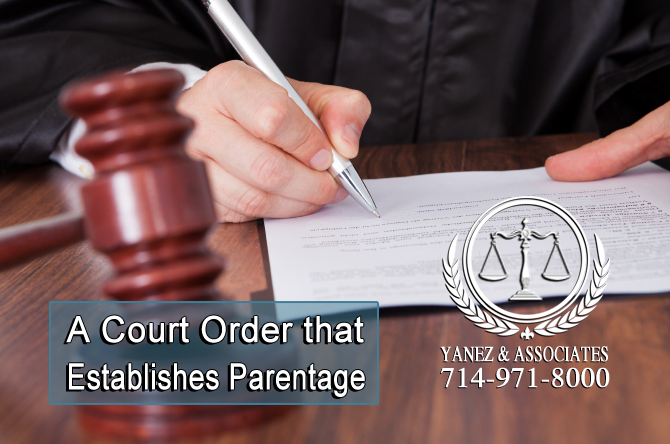
You may obtain a court order that establishes parentage either on your own or with the help of your local child support agency.
To do it on your own, you will need to go to court. It is best done with the help of the family law facilitator at your local court, and the assistance of a California family lawyer.
Make sure to file your case in the county where your child resides in California.
Creating Custody and Visitation Agreements in the OC

If you have already established parentage, your next step is to make sure that you have a legally enforceable child custody and visitation agreement in California.
In addition to establishing when the child will spend time with each parent, a parenting plan will determine who will be responsible for making decisions for a child. It is a good idea to have an attorney who has experience working in child custody in California to help you create your child custody and visitation agreement, especially if the child’s other parent has concerns about allowing the child to spend time with you.
Once you have a valid and legal custody agreement, it can be enforced, and your child’s other parent cannot legally stop you from spending time with your child.
If you are already having issues with your child’s other parent not allowing you to spend time with your child, it is important to create a detailed child custody plan. Consider a scheduled plan, where the court establishes a calendar that lists the times and dates when the child spends time with each parent.
In most cases, it is in the child’s best interests to spend time with both parents. A custody and visitation agreement will allow that to happen, and your custody and visitation plan can be tailored to your needs, your child’s needs, and the needs of your child’s other parents.
As a child grows older, the parenting plan may need to be revised; it is important to make sure that as a child’s needs change, the custody agreement continues to be in the child’s best interests and serve the child’s needs above the needs of you or your child’s other parent.
Make sure that you always keep a copy of your custody and visitation agreement in a secure location where you can access it. Anyone who is involved in the custody of your child, including anyone responsible for supervising a supervised visitation, or anyone who assists in getting the child from one parent to the other should also have a copy of your custody and visitation order. Remember that the existing custody and visitation order is legally enforceable until it has been legally modified, so if you need to make a change, do so as soon as possible and do not start following the new custody agreement until it has been legally approved.
Enforcing Custody and Visitation Agreements in Southern California
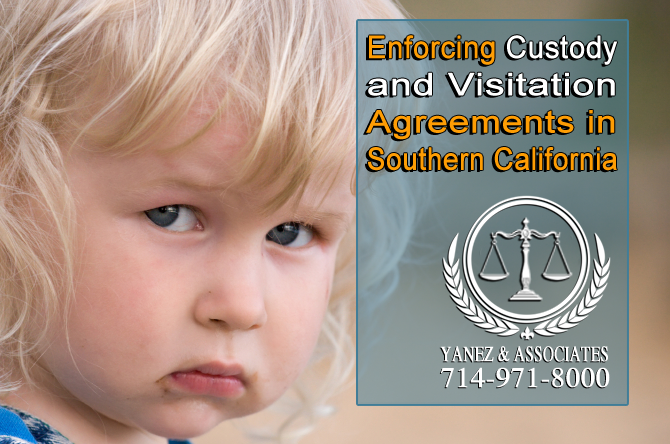
If you have already established parentage, you have an existing child custody and visitation order, and your child’s other parent will not allow you to spend time with your child, you may legally enforce your custody agreement.
First, contact your local police department for assistance in enforcing your court order. If your child’s other parent still does not follow the terms of the custody agreement, you have options.
If you do not know where your child is, or if your child’s other parent will not allow you to spend time with the child, you may contact your county’s district attorney in the Child Abduction and Recovery Unit.
Your third option when it comes to enforcing a child custody and visitation order is to file an action for contempt of a court order. This is a legal way of saying that the other parent has disobeyed a valid and legal court order, and it can have serious legal consequences.
If you are filing contempt of a court order case, it is important to be prepared. Make sure that you have accurate records of when you and your child’s other parent did follow the terms of your custody agreement, and when you failed to do so or were not able to due to the actions of the other parent.
Contempt of a court order cases can be complex, and are best faced with the help of a child custody attorney in California.
Worried about Child Kidnapping in California…
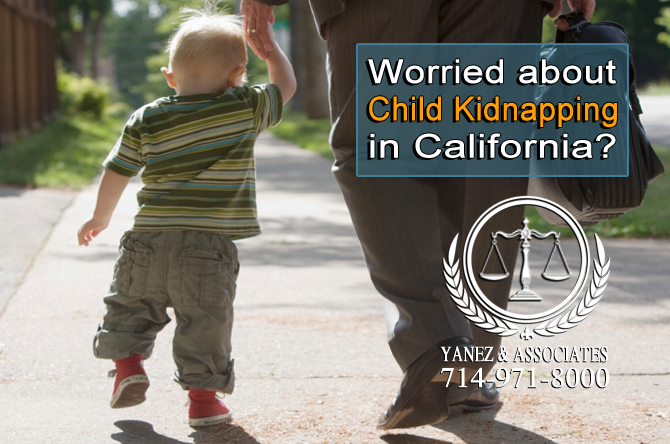
If your child’s other parent is not allowing you to spend time with your child and you are worried that he or she might take the child to a location where you cannot find your child, you may have a kidnapping case on your hands.
If you are worried about kidnapping, make sure that you keep a record of the contact information of anyone that your child’s other parent might know outside of California, including other states and other countries. In addition, make sure that you have information about the child and his or her other parent, including a recent photo that is no more than six months old, passport information, a written description, and contact information, including license plate numbers, addresses, phone numbers, email addresses, etc.
When a child is taken from the United States illegally, the Hague Convention may come into play. This is a way for the United States to work with other countries that are a part of the Hague Convention to return children safely to their home countries where custody can be determined, established, or enforced.
If, "other parent is not allowing me to see my children" it's time to contact an OC California Child Custody Attorney
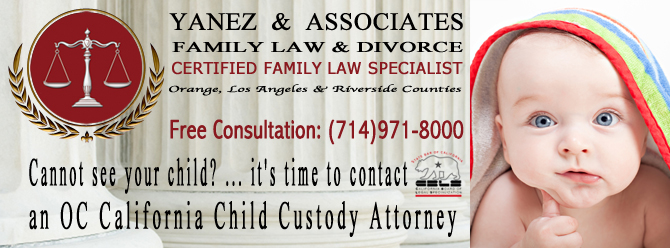
When it comes to child custody orders in California, protecting your child’s best interests is the priority.
When it comes to child custody orders in California, protecting your child’s best interests is the priority. If you are worried that your child’s best interests are not being protected or if you are not allowed to spend time with your child, you should contact a child custody attorney in California as soon as possible. Contact the attorneys at Yanez & Associates today to schedule your free initial consultation.








